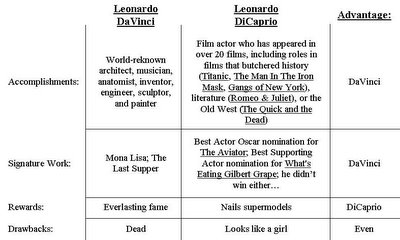January Offerings At The Movie Theater: Pick Your Poison (continued)
So what about the movies that have come out that have gotten great reviews? Here’s the lineup for this year:
Syriana – See, the War on Terror is just Bush’s war for oil, and the CIA is full of corrupt liars and murders, and Islamic terrorists who kill innocent people are just tragic, complex figures with good hearts and intentions, and the first Bush presidency and second Bush presidency are responsible for 9/11 (the intervening Clinton policy years had nothing to do with it), and the U.S. government would murder a reformist, moderate Arab leader at the bidding of American oil companies, and…..oh, never mind. Why spend $8.50 when I can read all of this on moveon.org?
Good Night And Good Luck – Yes, McCarthy’s zeal and recklessness were bad. Yes, people got hurt. Yes, as we know now from the Venona transcripts, there were Communist, Soviet spies working in the State Department…(whoops, how did that get in there?). Hollywood has treated the “Red Scare” topic numerous times before, and the makers of this film have said that the same thing is going on now, with “terrorist” replacing “Communist”. There’s a new black list, blah, blah, blah…OK, if there is such a black list against you, how did this film, and the numerous other left-of-center films, get made and distributed? To Hollywood, judging by the number of films made on the topic, the greatest crime of the 20th century (after Naziism) was McCarthyism. Not the 30-40 million people killed by Communist Russia, not the millions killed by China’s Communist Cultural Revolution, not the millions killed by Communist Pol Pot, not the millions killed after South Viet Nam fell. Hollywood has been strangely silent about this. In Hollywood math, the equation reads:

Glory Road – Takes the real motivation behind a real event (in pursuit of excellence, color-blindly play the best guys regardless of skin color) and rewrites it as something a left-of-center person wants to hear (to make a statement, color-consciously play five guys because of their skin color).
Real life: Coach Don Haskins builds a national championship college basketball team at Texas Western (now UTEP) in 1966, and defeat all-white, non-integrated Kentucky for the national championship. With his goal being excellence and winning, he starts the five best players on his team, regardless of the color of their skin. The five happen to be black, but the white players know that they’re the best five, so there is no team dissension….
Reel life: Coach Don Haskins builds a national championship college basketball team at Texas Western (now UTEP) in 1966, and defeat all-white, non-integrated Kentucky for the national championship. With his goal being affirmative action, he starts five black players to make a Statement. The white players, who are equally as good, are resentful (how dare they!) after the team’s only loss…
Call it "Shaping Reality To Meet An Agenda, Exhibit B".
The New World – Another John Smith and Pocahontas tale, again with the Native Americans as Noble Savages and the white settlers as loathsome creatures. At least there’s no stupid song this time…
Pocahontas’ life after her encounter with Smith is chronicled here, also. While we don’t know Pocahontas’ motivation for going to England nor for her conversion to Christianity, to the folks in Hollywood (wherever Christianity or Western culture is involved), it couldn’t have been a positive one: the movie depicts her as victim in her conversion, being swallowed up by this alien, hostile culture.
Naturally.
Munich – Eric Bana’s in it? Great! Steven Speilberg directs? Terrific? Written by Tony Kushner? Uh-oh. Having seen parts of Kushner’s execrable Angels in America, a play made into an HBO mini-series in which his AIDS-stricken characters offer long diatribes against Reagan and the conservatives and the religious leaders and the religious people responsible for their condition (though I doubt any of the aforementioned were in the room when they were having the unprotected sex during which they contracted the disease), and knowing that Kushner has repeatedly called the creation of Israel a "mistake" and blamed Israel for "the whole shameful history of the dreadful suffering of the Palestinian people", I had reason to suspect that this would not be the most balanced and accurate retelling of the 1972 Munich Olympic murder of 11 Israeli athletes and the subsequent Israeli manhunt for their killers.
Here’s the thing: long conversations could be had about the moral implications of hunting down and killing terrorists. Roughly, is it a) morally wrong, providing a continuation of the escalation of violence or b) necessary, as terrorism is a crime against humanity, and to leave it unpunished would be national suicide, or c) any one of numerous other nuanced views. Whatever your position, I will offer generous odds that you won’t see b) in your movie theaters any time soon….
Paradise Now – Palestinian suicide bomber as sympathic character. I mean, why shouldn’t they be? Other than the “I want to kill every Jewish man, woman, and child in Israel” thing, I mean…
Brokeback Mountain – Hmmmm…a reviewer named Jeffrey Overstreet sums up the story best: "Two people in a lonely outpost of Wyoming form strong bonds of friendship, then fall in love/lust and one night consummate their passion. In the moment they plunge into sex together, their relationship changes: their deepening care and understanding stops. They become controlled by and obsessed with their sexual connection. Their days of rich and flourishing friendship are numbered. The sex is not accompanied by any kind of promise, commitment, or intention to make this a lasting bond. In any kind of relationship, this is a rash and foolish step, almost certain to end in heartache. And sure enough, their partnership devolves into an increasingly contentious and damaging relationship that saps all other areas of their lives. They part ways, both marry other people and have children. When they meet again and demonstrate that they still cannot control their sexual attraction to each other, they quickly and selfishly break their marital vows and betray the trust of their spouses and children. In doing so, they all but guarantee that their own children will grow up similarly hurt, distrustful, and needy. Of course, their families are torn apart by all this, and everyone in the story ends up damaged by this selfish and destructive relationship....the story hardly qualifies as tragic, as the fallout was not caused by misunderstanding or folly, but deliberate choices. If anyone in the film is a “tragic hero,” it’s Alma, one of the spouses, who believed the marriage vows and who endured betrayal and assault without returning evil for evil……" Thanks, Jeff. Sounds pretty dark and depressing....
Oh, wait, the two people in question are two men? Forget everything!!! Take the above story, wash it through the laundromat of homosexual identity politics, and “Viola!” you’ve got…A BEAUTIFUL LOVE STORY!!! The only possible fault on anyone’s part must be of one-dimensional, anti-homosexual bigots!!! So it’s a BEAUTIFUL, TRAGIC LOVE STORY !!! About homosexuals!! So it's a BEAUTIFUL, TRAGIC, COURAGEOUS (because it takes great courage to make a movie that every one of your peers will laud and shower you with awards for) LOVE STORY !!!
Hello, Oscar !!!!
Never mind. I think I’ll stay home and, I don’t know, maybe read a book or something.






